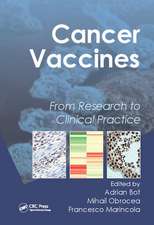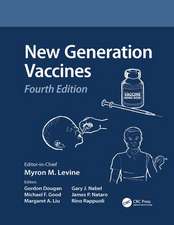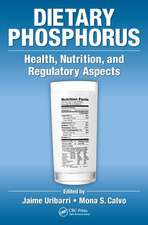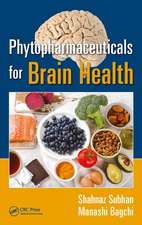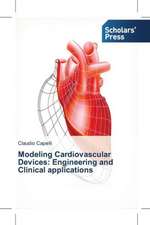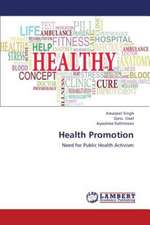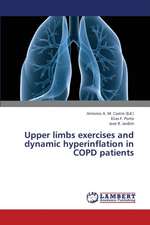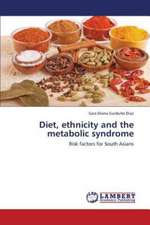Genetics in Human Reproduction: Routledge Revivals
Editat de Elisabeth Hildt, Sigrid Graumannen Limba Engleză Paperback – 30 iun 2020
| Toate formatele și edițiile | Preț | Express |
|---|---|---|
| Paperback (1) | 307.07 lei 6-8 săpt. | |
| Taylor & Francis – 30 iun 2020 | 307.07 lei 6-8 săpt. | |
| Hardback (1) | 751.97 lei 6-8 săpt. | |
| Taylor & Francis – 30 iul 2018 | 751.97 lei 6-8 săpt. |
Din seria Routledge Revivals
- 9%
 Preț: 801.71 lei
Preț: 801.71 lei - 8%
 Preț: 432.64 lei
Preț: 432.64 lei -
 Preț: 153.83 lei
Preț: 153.83 lei -
 Preț: 230.80 lei
Preț: 230.80 lei -
 Preț: 309.79 lei
Preț: 309.79 lei -
 Preț: 258.73 lei
Preț: 258.73 lei - 9%
 Preț: 764.35 lei
Preț: 764.35 lei - 9%
 Preț: 903.42 lei
Preț: 903.42 lei -
 Preț: 311.18 lei
Preț: 311.18 lei -
 Preț: 357.45 lei
Preț: 357.45 lei - 9%
 Preț: 606.36 lei
Preț: 606.36 lei -
 Preț: 317.54 lei
Preț: 317.54 lei - 9%
 Preț: 764.30 lei
Preț: 764.30 lei -
 Preț: 257.01 lei
Preț: 257.01 lei -
 Preț: 238.40 lei
Preț: 238.40 lei -
 Preț: 259.48 lei
Preț: 259.48 lei - 9%
 Preț: 903.81 lei
Preț: 903.81 lei -
 Preț: 326.26 lei
Preț: 326.26 lei -
 Preț: 258.67 lei
Preț: 258.67 lei -
 Preț: 294.98 lei
Preț: 294.98 lei -
 Preț: 308.89 lei
Preț: 308.89 lei -
 Preț: 199.86 lei
Preț: 199.86 lei -
 Preț: 347.50 lei
Preț: 347.50 lei -
 Preț: 302.59 lei
Preț: 302.59 lei -
 Preț: 389.40 lei
Preț: 389.40 lei -
 Preț: 257.01 lei
Preț: 257.01 lei -
 Preț: 343.22 lei
Preț: 343.22 lei - 9%
 Preț: 640.91 lei
Preț: 640.91 lei - 9%
 Preț: 619.49 lei
Preț: 619.49 lei -
 Preț: 228.88 lei
Preț: 228.88 lei -
 Preț: 265.16 lei
Preț: 265.16 lei -
 Preț: 245.11 lei
Preț: 245.11 lei -
 Preț: 258.54 lei
Preț: 258.54 lei -
 Preț: 258.73 lei
Preț: 258.73 lei -
 Preț: 368.93 lei
Preț: 368.93 lei -
 Preț: 246.38 lei
Preț: 246.38 lei - 9%
 Preț: 832.08 lei
Preț: 832.08 lei -
 Preț: 258.67 lei
Preț: 258.67 lei -
 Preț: 286.99 lei
Preț: 286.99 lei - 18%
 Preț: 695.86 lei
Preț: 695.86 lei - 9%
 Preț: 934.96 lei
Preț: 934.96 lei - 5%
 Preț: 243.38 lei
Preț: 243.38 lei -
 Preț: 274.69 lei
Preț: 274.69 lei -
 Preț: 200.67 lei
Preț: 200.67 lei - 9%
 Preț: 638.62 lei
Preț: 638.62 lei -
 Preț: 259.69 lei
Preț: 259.69 lei - 9%
 Preț: 1038.47 lei
Preț: 1038.47 lei -
 Preț: 389.46 lei
Preț: 389.46 lei -
 Preț: 302.14 lei
Preț: 302.14 lei -
 Preț: 302.27 lei
Preț: 302.27 lei
Preț: 307.07 lei
Preț vechi: 323.23 lei
-5% Nou
Puncte Express: 461
Preț estimativ în valută:
58.76€ • 62.83$ • 48.99£
58.76€ • 62.83$ • 48.99£
Carte tipărită la comandă
Livrare economică 17 aprilie-01 mai
Preluare comenzi: 021 569.72.76
Specificații
ISBN-13: 9781138314986
ISBN-10: 1138314986
Pagini: 336
Dimensiuni: 152 x 229 x 18 mm
Greutate: 0.45 kg
Ediția:1
Editura: Taylor & Francis
Colecția Routledge
Seria Routledge Revivals
Locul publicării:Oxford, United Kingdom
ISBN-10: 1138314986
Pagini: 336
Dimensiuni: 152 x 229 x 18 mm
Greutate: 0.45 kg
Ediția:1
Editura: Taylor & Francis
Colecția Routledge
Seria Routledge Revivals
Locul publicării:Oxford, United Kingdom
Cuprins
Part 1: Medical and Scientific View 1. Clinical Experience with PID and ICSI, Ingeborg Liebaers, K. Sermon, C. Staessen, H. Joris, W. Lissens E. Van Assche, P. Nagy, M. Bonduelle, M. Vandervorst, P. Devroey, A. Van Steirteghem 2. The Various Micromanipulative Procedures: State of the Art, Chances and Risks, Dieter Meschede and Jurgen Horst 3. The Relation Between ICSI and Genetic Diagnosis from an Ethical Point of View, Barbara Maier 4. Modification of IVF Application and Access to IVF Services by PID?, Brian A.. Lieberman 5. Examples for Possible PID Indications – Scientific Background and Reflections on Effects, Ulrike A. Mau 6. Should there be a Uniform List of Genetic Diseases Allowing Access to PID?, Hansjakob Muller 7. Nuclear Transplantation – Medical and Ethical Aspects, Gerd Richter and Matthew D. Bacchetta Part 2: Personal Interests and Moral Implications 1. Ethics of Preimplantation Genetic Diagnosis, Guido de Wert 2. Preimplantation Diagnosis. A Reflection in Light of Personalist Ethics, Paul Schotsmans 3. Ethical Aspects of Germline Gene Therapy, Alexandre Mauron 4. ‘Quality Control’ in Reproduction – What can it Mean, What should it Mean?, Dieter Birnbacher 5. Does Gene Therapy have Ethically Problematic Effects on Idenity?, Ingmar Persson Part 3: Moral Rights and Duties 1. Does PID Solve the Moral Problems of Prenatal Diagnosis? A Rights Analysis, Deryck Beyleveld 2. Ethics of Research on Human Embryos, Reiner Wimmer 3. Categorical Arguments – Pro Life versus Pro Choice?, Maureen Junker-Kenny 4. Selection Through Prenatal Diagnosis and Preimplantation Diagnosis, Hille Haker Part 4: Social Concepts and Moral Implications 1. Eugenics Comes Back with Medically Assisted Procreation, Bernard Sele and Jacques Testart 2. Germline Gene ‘Therapy’: Public Opinions with Regard to Eugenics, Sigrid Graumann 3. Predictive Genetic Medicine – A new Concept of Disease, Lene Koch 4. Animal Models: An Anthropologist Considers Dolly, Sarah Franklin 5. Issues Surrounding Preimplantation Diagnosis and Germline Gene Therapy, Alexandre Quintanilha 6. Beside the Point – Reflections on Passivity, Paul J.M van Tongeren Part 5: Choices and Decision Making 1. What Claims can be Based on the Desire for a Healthy Child? Towards an Ethics of ‘Informed Desires’, Walter Lesch 2. The European Alliance of Genetic Support Groups, Ysbrand Poortman 3. Some Reflections on the use of the Term ‘Prevention’ in Reproductive Medicine, Elisabeth Hildt 4. Preimplantation Diagnosis – Implications for Genetic Counselling, Ruth Chadwick Part 6: Health Care, Justice and Regulation 1. Legal Regulations Concerning Preimplantation Diagnosis, Jennifer Gunning 2. Reproductive Technology and the Slippery Slope Argument: A Message in Blood, Tony McGleenan 3. Measuring the Benefits of IVF, Emma McIntosh and Mandy Ryan 4. Justice and Preimplantation Diagnosis, Joke de Witte 5. The Role of Ethics Codes in Medicine – How can they be helpful in making decisions?, Stella Reiter-Theil.
Notă biografică
Elisabeth Hildt is professor of philosophy and director of the Center for the Study of Ethics in the Professions at Illinois Institute of Technology, where her research focuses on philosophical and ethical issues in neuroscience, most significantly the field of cognitive enhancement. Her previous appointments include scientific coordinator of the interdisciplinary project European Network for Biomedical Ethics and assistant professor at the Chair for Ethics in the Life Sciences at the University of Tubingen. Prior to moving to the Illinois Institute of Technology in 2014, she spent six years as the head of the Research Group on Neuroethics/Neurophilosophy at the University of Mainz. She serves on the editorial board of PLOS ONE and the American Journal of Bioethics Neuroscience (AJOB Neuroscience). She has authored and edited twelve other books on neuroethics and biomedical ethics, and is the author of 70 articles on the subject.
Descriere
Published in 1999, this text deals with interdisciplinary approaches to pre-implantation diagnosis and germline gene therapy in the fields of medicine, human genetics, philosophy, theology and social science. It covers issues such as, the moral status of the embryo, and the validity of protecting the human genome.

